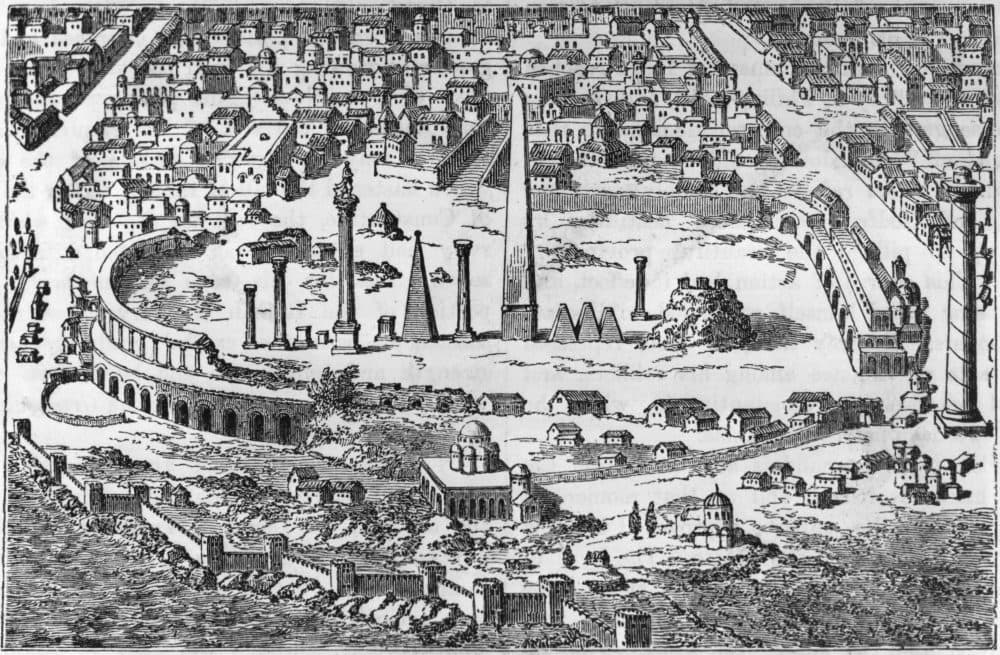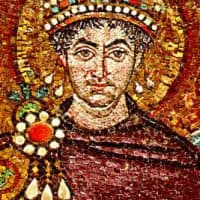Advertisement
Violence, Sex And Chariot Racing: The Story Of The Nika Riots

The first thing you need to know about the Emperor Justinian is that his motto was essentially "Make The Roman Empire Great Again."
Justinian came to power in 527 A.D., about 50 years after the fall of the Western Roman Empire. Justinian ruled the Eastern Roman (also known as the Byzantine) Empire out of Constantinople.
"He felt, I think, fairly strongly that the Roman Empire had taken a huge hit before his reign, and that it was his duty, really, as emperor to try and reconquer as much of that as possible," says historian Mike Dash.
The second thing you need to know about Justinian is that he married a prostitute. And not just any prostitute.
She was "the most scandalous woman of the age," Dash says.
Theodora: Bearkeeper's Daughter, Courtesan, Empress
Her name was Theodora, and she was the daughter of a bearkeeper. As was likely the fate of many bearkeepers, Theodora's father died unexpectedly.
A lot of what we know about Theodora comes from a contemporary historian named Procopius. Theodora grew up to become an actress, which, Procopius explains, had a very different meaning back then.
"There was no shame in the girl, and no one ever saw her dismayed."
Procopius
"She became a courtesan, and such as the Ancient Greeks used to call, a common one, at that: for she was not a flute or harp player, nor was she even trained to dance. But only gave her youth to anyone she met, in utter abandonment," Procopius wrote. "There was no shame in the girl, and no one ever saw her dismayed."
It’s believed that Justinian attended one of Theodora’s performances and was absolutely smitten — which explains how a bearkeeper’s daughter turned courtesan ended up as Empress.
Theodora may not have been the obvious pick for the job, but she was smart and she understood the citizens of Constantinople — qualities that would one day play a critical role in preserving Justinian’s reign. But we’re getting ahead of ourselves.
First, we have to learn about the Imperial pastime: chariot racing.
'They Were Massively Popular Events'
"They were massively popular events," Dash says. "I mean, they were the NFL and the MLB rolled into one in terms of sporting entertainment."
During the days of Roman Empire, leaders tried to win favor by putting on elaborate games. Gladiatorial contests had mostly died out by the sixth century, but most cities across the Empire had their very own chariot racing stadiums. The biggest of all was right in Constantinople. It was called the Hippodrome. It was about four times the size of a football field and shaped like a massive horseshoe. It held around 100,000 people.
A secret passageway connected the Imperial Palace directly to the imperial box, where the emperor would watch the chariot races from his throne. (Imagine the Queen of England having her own tunnel directly into Wembley Stadium.)
Down below, up to 12 charioteers, each on a chariot pulled by four horses, raced around a track just 150 feet wide. Deaths were common. It didn't help that spectators sometimes tossed nail-studded tablets onto the track. They also wagered large sums of money on the races.
At the time, there were two rival chariot racing teams: the Blues and the Greens. Both had big followings in Constantinople. And this is where sports and politics really become intertwined.
Advertisement

"There is one group of historians who essentially say that the Blues and Greens were effectively almost prototype political parties," Dash says. "The Blues were the sort of party of the authorities — the Emperor himself, Justinian, was a well-known partisan of the Blues. And the Greens were the party of the plebs, the people."
As I said earlier, Justinian was focused on taking back the Roman Empire's lost territory. But war costs a lot of money.
So, Justinian raised taxes. Even on wealthy people. And wealthy people do not like being taxed.
So the citizens of Constantinople grew frustrated.
"Not all the Blues were willing to follow his leadership, but there were plenty who were eager for civil war," Procopius wrote.
Civil war may not have begun at the chariot races, but fights regularly broke out in the stands.
And that brings us to the year 532 A.D.
United Against The Government
"It's really a powder keg," Dash says. "And what happened in 532 was that there was a fight in the Hippodrome between the partisans of the Blues and the Greens. The local police force, which essentially is the Imperial Guard, waded in to separate the two sides. And there was a trial, and seven men were sentenced to be hanged."
The hanging was scheduled for a few days later on the banks of the Bosphorus. The first five men were successfully executed.
"And then the gallows collapsed as the last pair were being hanged," Dash says.
We’re not really sure why the gallows suddenly collapsed. But the crowd of Blues and Greens took it as a sign from God that the men were not meant to die.
"And they waded in and rescued the two guys, one of whom was a Green and one of whom was a Blue, and they hustled them off to sanctuary in a nearby church," Dash explains. "So you have a situation where, for once, the Blues and the Greens, in a sense, are united against the government. And that's really where it all starts going horribly wrong."
Yes, even more horribly wrong.
Because at the next chariot race, the partisans of the Blues and Greens returned to the Hippodrome and, Dash says, "rather than fighting each other, they suddenly start showing rather disconcerting signs of being on the same side.
"And the words that they're screaming are ones that you very often hear in chariot races at this time, and they're just shouting out, 'Nika!' 'Nika!' which is Greek for 'Win!' 'Win!' Normally you would use that to encourage your charioteer to win the race. But it becomes rather obvious that what they're really talking about is the victory of the Greens and the Blues over the emperor.
"So what happened was the order went out, 'Shut the races down now. We've gotta regain control of the situation.' And when the Hippodrome was shut down, the crowd streamed out into the streets of Constantinople. And rather than dispersing, they began simply to burn the city down."
According to Procopius, "Fire was applied to the city as if it had fallen under the hand of an enemy."
Crushing The Insurrection
While the city burned, Justinian holed up in the Imperial Palace. A day passed, and the rioting didn't stop. Then another day passed. Still no sign of stopping.
The rioters returned to the Hippodrome and made it a sort of headquarters. This must have made the emperor nervous — remember, the Hippodrome was directly connected to the Imperial Palace.
To try and appease the mob, Justinian dismissed his hated tax collector. That didn't work. The rioters continued to burn the city. Justinian grew more and more anxious.
On the fifth day of the riot, the Blues and Greens appointed a new, rival emperor, who was seated on the throne inside the Hippodrome.
Justinian considered fleeing.
"Well, this is where Theodora really sort of proves her mettle," Dash says.
Theodora allegedly said to her husband:
If you, my lord, wish to save your skin, you will have no difficulty in doing so. We are rich, there is the sea, there too are our ships. But consider first whether, when you reach safety, you will regret that you did not choose death in preference. As for me, I stand by the ancient saying: The purple is the noblest winding-sheet.
"In other words, you should die rather than give up the power of being emperor," Dash explains. "And she shamed Justinian into staying and fighting."
Justinian gathered two of his Generals. He told them to plan a counter strike.
According to one apocryphal account, one General appeased the Blues by bribing them with gold coins and reminding them that Justinian supported their side. But Dash says the truth is likely far more brutal.
One General led his troops through the Hippodrome’s main entrance. The other used the Imperial Guard to barricade all the other exits, trapping the lesser-armed and disorganized rioters inside.
"Numbers tend to get exaggerated, but we are told that 30,000 people were killed inside the stadium in less than a day," Dash says.
The newly appointed rival emperor was executed, and his body was tossed in the sea.
As Procopius put it, "This was the end of the insurrection in Byzantium."
The End Of Chariot Racing
Justinian's power was once again secure. As an extra "screw you" to the people of Constantinople, he even reappointed that dreaded tax collector.
Justinian ruled for another three decades, until his death in 565. And Justinian and Theodora left the Empire in a powerful position.
"It lasts for another 900 years after his death — at no point in that time does it have borders as wide as the ones Justinian set for it," Dash says.
But chariot racing did not recover from what would become known as the Nika Riots.
"Because what we've seen is what can go horribly wrong when the people get too excited by these games," Dash says. "So what happens, in fact, is that people start putting their passion not into chariot racing but into theological debate. And people start forming new factions, rather than over Blues and Greens in the Hippodrome, over different interpretations of verses in the Bible."
Ah, but that’s a story for another day and another show.
To read more about the Nika Riots, check out Mike Dash's article for Smithsonian Magazine: "Blue versus Green: Rocking the Byzantine Empire."
Thanks to our actors: Eric Cheung and Erika Lantz.
This segment aired on October 21, 2017.
